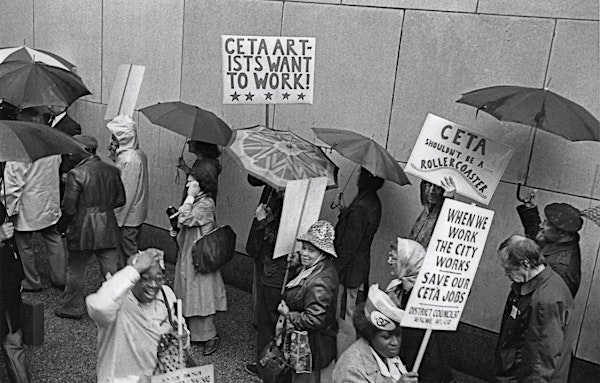
May Day: CETA
How can CETA, a seminal yet forgotten federal jobs program, might help shape our conversations around labor policies today?
Date and time
Location
Creative Time
59 East 4th Street Floor 7 New York, NY 10003About this event
- 2 hours
This May Day, learn about the Comprehensive Employment and Training Act (CETA), a federal jobs and training program enacted in 1973 under President Richard Nixon. While never intended to specifically support them, artists recognized CETA's public service employment provision as a significant opportunity for a paradigm shift in infrastructure-building within the field. Providing jobs to over 20,000 un- or underemployed culture workers in over 200 municipalities and indigenous territories (including over 300 in New York City), CETA presented some of the first opportunities for many culture workers to simultaneously gain stability and take creative risks. Fifty years later, we join art historians and researchers Molly Garfinkel and Jodi Waynberg to consider the utility of this history in today's labor advocacy.
This presentation builds from Garfinkel and Waynberg’s years-long research on the impact of CETA funding on the arts and culture sector across the nation. The project began with the 2021 two-venue exhibition ART/WORK: How the Government-Funded CETA Jobs Program Put Artists to Work (more info here).
Photo by Sarah Wells (1979) for the CETA CCF Artists Project. © Estate of Sarah Wells 2021
As Co-Director of City Lore and the Director of City Lore’s Place Matters program, Molly Garfinkel (she/her) leads initiatives related to cultural resource management, public history, exhibition curation, public education, historic preservation, and traditional arts presentation. Her research explores Western and non-Western building traditions, theories of cultural landscapes, cultural policy, and histories of urbanism and city planning. Molly has published articles in the University of Oregon’s CultureWork Broadside, Voices, The Journal of New York Folklore, the University of Pennsylvania’s LA+ Design Journal, the Journal of American Folklore, and with the National Endowment for the Arts’ Office of Research & Analysis. Her research into CETA’s impact on the cultural workforce began in 2017, and in 2021, she co-curated the exhibition ART/WORK: How the Government-Funded CETA Jobs Program Put Artists to Work with Jodi Waynberg. Garfinkel is a recipient of the 2024 NY State Historic Preservation Award for successfully nominating New York City’s Puerto Rican casitas to the NY State Register of Historic Places. She holds a B.A. in Art History from Wesleyan University and an M.A. in Architectural History from the University of Virginia.
Jodi Waynberg (she/her) is a curator and arts administrator based in New York City. She is the Executive Director of Artists Alliance Inc., a Lower East Side non-profit dedicated to supporting the careers of emerging and under-recognized artists and curators through paid residencies, exhibitions, and commissioned projects. Previous curatorial projects include The Real Estate Show, What Next: 2014 (New York, 2014), Peekskill Project 6 (Peekskill, 2015), “Shadow Cabinet” A Loyal Opposition Response (New York, 2017), Keep Me Nearby (New York, 2019), and ART/WORK: How the Government-Funded CETA Jobs Program Put Artists to Work (New York, 2021), with Molly Garfinkel. Her curatorial work has been featured in The New Yorker, WNYC Radio, i-D, Artnet, Brooklyn Rail, and Fractured Atlas. Waynberg has served as a visiting critic and speaker for The National Arts Club, El Museo del Barrio, Hunter College MFA Program, New York University Masters of Arts Administration program, The New School, Pratt University, Wave Hill, Flux Factory, Residency Unlimited, and Wassaic Project. She serves on the Board of Critical Practice Inc. and the executive committees of the Essex Market Vendor Association and the LES Partnership. Waynberg began her career in San Francisco as the Associate Curator at the Contemporary Jewish Museum. She graduated Phi Beta Kappa from the History of Art and Visual Culture program at the University of California, Santa Cruz.
Accessibility
CTHQ is located on the 7th Floor of 59 East 4th Street between 2nd and 3rd Avenue in Manhattan. The building entrance has no steps and elevator access is provided directly to CTHQ. Service animals are welcome.
A variety of seating options are available including: wooden chairs with backs and wooden benches and stools. This event begins at 6:00 pm and ends at 8:00 pm.
Accessibility Requests
If you have any questions regarding accessibility or to request specific accommodations, please email: curatorial@creativetime.org.
Covid Guidelines
While masks are not required, they are available to all guests at CTHQ and mask-wearing is encouraged. If you are feeling sick or have tested positive for Covid-19, we ask that you please refrain from participating in CTHQ programs in order to care for fellow community members.
Transportation
The closest MTA subway stations are: Astor Place on the 6 line, 2nd Avenue on the F line, and 8th Street-NYU on the R Line. These stations are not wheelchair accessible. The closest wheelchair accessible stations are: Bleecker Street on the 6 line and Broadway-Lafayette on the B/D/F/M line, with an elevator on the north side of Houston St. between Lafayette St. and Crosby St. Parking in the vicinity is free after 6 PM.